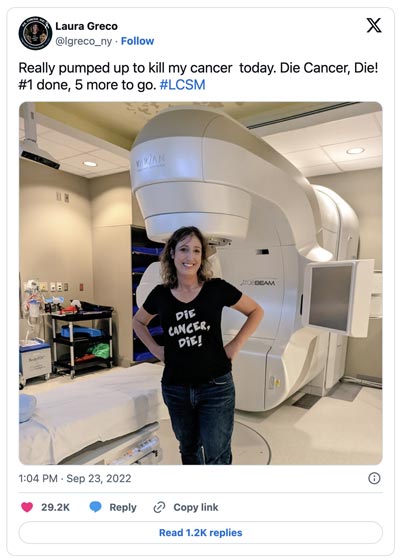Laura Greco had not yet reached her 40th birthday when she was diagnosed with non-small cell lung cancer in 2015. Not quite 10 years later, on July 13—at only 49 years old—her personal battle with the disease came to an end. While some patients avoid the metaphor of war to describe their cancer journeys, Ms. Greco embraced it—not from a desire for combat, but because she saw her diagnosis as a mission to be accomplished.
Indeed, her diagnosis was the catalyst for her vow to “make it count;” a mission that guided her to educate, advocate, and challenge the status quo.

Her advocacy efforts began with attempts to teach anyone who would listen just how deadly lung cancer is. Her efforts led her to become a member of IASLC’s STARS (Supportive Training for Advocates on Research and Science) program, where she trained to be a patient research advocate. With her STARS training and expertise as an accomplished attorney, Ms. Greco became well-known in the lung cancer community and beyond for her passionate advocacy.
In challenging the status quo and pushing the boundaries of what patient-centered research and care could achieve, it became clear that Ms. Greco had a unique ability to provoke change. She never hesitated to speak out, and regularly pointed out areas for improvement within the community. Whether it was challenging doctors, urging researchers to innovate, or demanding faster action from policymakers, her message was clear: patients deserve better, and we must do better!
One of her significant contributions was advocating for the US Department of Defense Lung Cancer Research Program to expand its focus, leading to the inclusion of brain and leptomeningeal metastases as a critical area of emphasis, enhancing the understanding, detection, and treatment of these challenging aspects of lung cancer.
Her approach to her cancer was as determined as her advocacy. After exhausting traditional therapies, Ms. Greco tried three different innovative drug combinations, with two proving successful. Her willingness to take risks wasn’t just about her own survival but about forging a path for others; knowing that progress requires steps into the unknown to gamble on behalf of a larger community.
Nothing embodied her fighting spirit more than the “Die, Cancer, Die!” t-shirt she made and wore to every session of brain radiation. A photo of her wearing it in front of the SRS machine went viral and became a powerful fundraising symbol—raising crucial funds for lung cancer research. It was only fitting that she was buried in that shirt, a final testament to her unrelenting fight against lung cancer.
Ms. Greco’s legacy is one of urgency, persistence, and an unwavering demand for better—for herself, for other patients, and for the entire lung cancer community. It serves as a reminder of why those in the thoracic oncology community do what they do; why international collaboration and research are so important.
She made her fight count, and we are all the better for it.
Ms. Greco is survived by her two sons, Rhys (15) and Fletcher (12), and her husband of 25 years, Tillman Nechtman, as well as countless other friends and family members.





